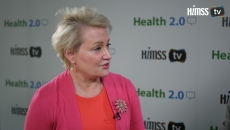Quality and Safety
Ari Tulla, CEO of Quest Analytics, compares the U.S. and European healthcare systems - and explains why eliminating data silos is key to outcome improvements in each.
AI and SDOH developed separately, but they're now converging as technology keeps up with the need to make actionable use of data.
Susan Dentzer, president and CEO of the Network for Excellence in Health Innovation (NEHI), discusses Healthcare Without Walls, saying technology is no longer a barrier to at-home healthcare.
From 1980 through 2018, the FDA approved a total of 126 cancer drugs to treat solid and hematologic tumors.
Emily Hine, VP of business development at Meru Health, discusses how the online clinic can interrupt the downward spiral of depression and anxiety that could lead to suicide.
DrChrono co-founder and COO Daniel Kivatinos gives a rundown of his company's mobile EHR platform and demonstrates how it works on either a tablet or smartwatch.
The legal and technological picture surrounding data is a muddy one, and the healthcare industry is scrambling to keep up.
SPONSORED
Philippe Wackers, NetApp's EMEA healthcare innovation manager, says his company aims to focus on the citizen's data fabric, which empowers them to stay in control of their data wherever they would like to store it.
A healthcare organization with a bit of capital can invest in the workforce it already has to ameliorate the effects of a tight labor pool.
Preemptive kidney transplants covered by Medicaid have shown much greater increases in expansion states.





